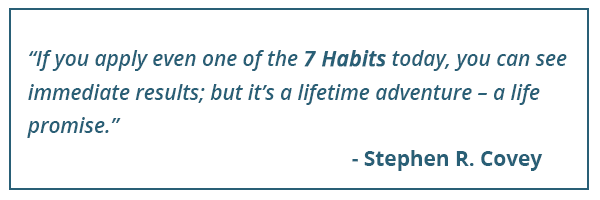
Almost every person has heard of or read The 7 Habits of Highly Effective People by Stephen R. Covey. To be honest, I had heard of this book throughout most of my life. My dad had the book and I frequently saw it sitting on his desk at home, but I never once took the opportunity to dig into this myself and learn what all the hoopla was about.
It was the summer of 2016 when the 7 Habits came into my life in a profound way. I was the Parent Teacher Organization President at my daughter’s school where they implemented what was called the “Leader In Me” structure. I had no idea what that meant, but I knew it was going to positively impact our children attending this school. With the role that I was serving in the next two years, the principal asked me to join their training sessions by Franklin Covey. This was when my life changed significantly.
What is The 7 Habits Promise?
By living out the 7 Habits, you will become profoundly more effective in the things that matter most to you in your work and personal life.
Effectiveness Defined
The essence of effectiveness is that you get results you want today in such a way that you can get even better results in the future.
Like the top of a tree, people see your personality, they get a picture of who you are. Although image, techniques, and skills can influence our success, the real source of lasting effectiveness lies in a strong character – the roots.
I became enamored with this philosophy very quickly. I already had the foundation of the Great Game under me and now combining the 7 Habits with GGOB gave me inspiration to do things in a greater way than ever before.

Maybe you are saying this is all new to me. Maybe you were like me and heard about it but had never taken time to explore the 7 Habits yourself. Let me share a brief overview of the 7 Habits and discuss how they can greatly affect your Game.
Habit 1: BE PROACTIVE
Responsibility, Accountability, Initiative, Resourcefulness, and Choice
Being proactive is the habit of personal responsibility. What you do in private can and will affect others around you. In Habit 1, you can choose to be proactive or reactive and many of us are more on the reactive side. So what are some effective practices of those who practice Habit #1?
- Pause and respond based on principles and desired results
- Use proactive language
- Focus on your Circle of Influence
- Become a Transition Person
When people are reactive, they allow their outside influences (moods, feelings, circumstances) to control their response. Stimulus overshadows our response.
But people who are proactive pause just a moment or two to allow themselves the freedom to choose their response based on principles and desired results. Their freedom to choose expands as they wisely use the space between stimulus and response. Stimulus – Freedom to Choose – Response.
Take a minute and think about a time that you had reactive behavior. When are you most likely to respond reactively? What did you say, do, think or feel? Where do your reactive tendencies come from?
Habit 2: BEGIN WITH THE END IN MIND
Vision, Commitment and Purpose
Beginning with the end in mind is the habit of personal vision. People who practice this habit live by design and not by accident. People who practice Habit 2 practice these specific behaviors:
- Define outcomes before you act.
- Create and live by a personal mission statement.
By defining outcomes before you act, your mental turns into physical. This means your mental concept is your first creation where you define the outcomes, and the physical is your second creation where you achieve outcomes. The steps to this process include:
- A clear agenda and objective – a productive meeting
- Well-researched market and specifications – a successful product in the marketplace
- A goal with a clear end point and deadline – a goal achieved with excellence
- A compelling personal mission statement – a life of contribution and fulfillment
Do you Begin With the End in Mind?
Habit 3: PUT FIRST THINGS FIRST
Focus, Integrity, Discipline, and Prioritization
Put First Things First is the habit of personal management. It is important to focus on your highest priorities. You must eliminate the unimportant in order to complete the most important.
- What are necessities - your absolutes? These things are urgent.
- What is effectiveness? These are items that can wait and won’t hurt if you don’t complete them today, non-urgent items.
- What is in your category of distraction? These are not important items but they sometimes can be urgent, surprisingly enough. These items can be needless interruptions, unnecessary reports, irrelevant meetings, other people’s minor issues, etc.
- Then last you have waste...eww. This is definitely a category that is non-urgent, but somehow we get sucked into these during our day. It doesn’t mean these items are bad but they can definitely defer us from accomplishing other things. Items that fall into this category are trivial work, avoidance activities, social media, excessive relaxation. There are a time and place for these items but they should not fall into our important and urgent category.
How Can These Habits Apply to the Great Game?
Know & Teach the Rules
#1 Be Proactive- numbers are just numbers unless you have rules surrounding them that give employees a definition of whether they are winning or losing. People can’t even play The Game if they don’t know the rules. Develop a transparent workplace leadership team and provide education into the numbers.
#2 Begin with the End in Mind- think of where you want to be a year from now. How are you going to accomplish that? What are your rocks (High-Involvement Planning™)? When The Game is created with broad participation, it creates a level of commitment that can’t be matched.
#3 Put First Things First - this goes right back into being proactive. Everyone has to know the Critical Number™. This is the financial or operational number that defines winning. When correctly identified through High-Involvement Planning, targeted and tied to a reward, the Critical Number becomes the focus of The Game for everyone in the organization.
Now that you know the basics of the first few habits, you can easily see how these can contribute very positive elements to your Game. Apply just one of these habits today and you are sure to see a positive impact.
Habits 1, 2, and 3 all fall into the private victory category. Learn about the public victories and rest of the 7 Habits in part two of this blog!

Other Articles You Might Like:
.png)






.png)




-5.png)
.png)
